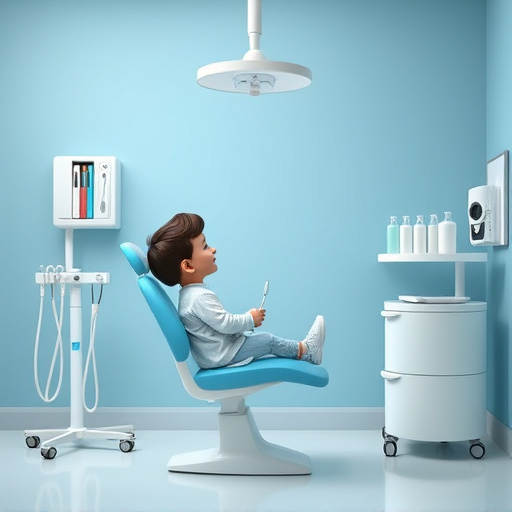Dental anxiety among individuals with special needs requires specialized care. Understanding non-verbal cues, sensory sensitivities, and past traumas is key to developing effective treatment strategies. Personalized approaches include sensory-friendly visits, adaptive equipment, and tailored treatments. Creating a comfortable environment through collaborative efforts improves patient outcomes by fostering security and comfort during dental procedures.
Dental anxiety can significantly impact special needs patients, making routine care challenging. This article explores effective strategies to address and overcome dental anxiety in this unique population. By understanding the specific needs of these patients, healthcare providers can implement customized treatment approaches. We delve into various techniques to create a comfortable dental environment, ensuring positive experiences for special needs individuals and their caregivers. Discover practical tips and insights on managing dental anxiety, enhancing overall oral health for these patients.
- Understanding Dental Anxiety in Special Needs Patients
- Customized Treatment Approaches for Different Needs
- Effective Strategies for Comfortable Dental Visits
Understanding Dental Anxiety in Special Needs Patients

Dental anxiety is a common concern among individuals with special needs, often requiring tailored and compassionate approaches to ensure they receive necessary oral care. These patients may experience heightened levels of fear, distress, or even panic when visiting the dentist, which can be attributed to various factors such as sensory sensitivities, communication barriers, or past traumatic experiences. Recognizing and understanding these anxieties is the first step in developing effective treatment strategies.
Special needs patients might struggle with expressing their discomfort verbally, making it crucial for dental professionals to observe non-verbal cues and adapt their practices accordingly. Providing a calming environment, utilizing gentle communication techniques, and incorporating sensory tools can significantly help alleviate dental anxiety. Additionally, offering comprehensive dental care tailored to their specific needs, including emergency dental care when necessary, ensures their oral health is addressed holistically while addressing any fears they may have.
Customized Treatment Approaches for Different Needs

Addressing dental anxiety requires a tailored approach, especially for patients with special needs. Each individual has unique challenges and requirements that must be considered when creating a treatment plan. For instance, a patient with autism spectrum disorder might benefit from sensory-friendly dental visits, incorporating techniques to reduce overstimulation and create a calm environment. These methods could include offering noise-reducing headphones or using calming tools during procedures.
In contrast, patients with physical disabilities may require adaptive equipment to ensure comfort and accessibility during dental cleanings and other procedures. Customized treatments might involve dental bonding to restore or protect teeth, especially in cases of decay or damage. Providing comprehensive dental care tailored to these specific needs can significantly improve patient outcomes and overall oral health.
Effective Strategies for Comfortable Dental Visits

Creating a comfortable environment is key to managing dental anxiety for special needs patients. Simple yet effective strategies can significantly enhance their experience. One approach is to involve parents or caregivers in the process, allowing them to serve as a comforting presence and bridge communication with the dental team. Customized, age-appropriate explanations about procedures and tools can also alleviate fears. Many dentists employ visual aids, stories, or even music to distract and relax patients.
Additionally, incorporating technology like clear aligners and digital imaging can make dental visits more appealing and less intimidating. Regular scheduling, consistent staff, and a welcoming atmosphere in the family dentistry setting contribute to positive experiences. Simple teeth cleaning routines, when introduced gradually and positively, can help normalize dental care. These collaborative efforts ensure that each visit is not just about treating dental issues but also about fostering a sense of security and comfort for these special patients.
Dental anxiety can significantly impact special needs patients, but with tailored treatment approaches and effective strategies, it’s possible to create a more comfortable and positive dental experience. By understanding each patient’s unique needs and implementing customized care, we can address dental anxiety head-on, ensuring these individuals receive the essential oral health treatments they deserve. Through collaborative efforts between dental professionals, caregivers, and specialists, we can navigate the challenges and foster a nurturing environment, ultimately improving overall oral health outcomes for special needs patients. This tailored approach to dental anxiety treatment is a crucial step towards enhancing their quality of life.














